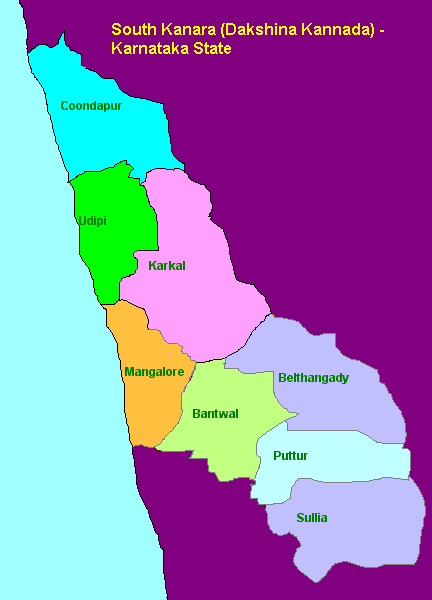

In 1947 this district included Kasargod, which is to the south of Mangalore/Bantwal. Puttur included Sullia, and Karkal included Belthangady. This was the 26th district of the Madras Presidency before independence. This district became a part of the Karnataka state and Kasargod was transferred to Kerala.
The people of this district speak, Kannada, Tulu and Konkani. The last has special dialects as spoken by Hindu Konkanas and Saraswats - the Catholics have a distinct dialect which differs from the Goan Konkani, in nuances and inflections.
This is an agricultural area, and mostly rice is grown here. Beyond Belthangady to the East, are the Western Ghats and on the eastern slopes, coffee is grown. This falls in the Coorg district.
The Konkan railway traverses from north to south along the coast. Before it came, Mangaloreans had to make a 4 days journey, via Kerala, Tamilnadu, Andhra Pradesh to Bombay. The trains in those days were powered by steam engines.
Besides the railways, Mangalore has its own airport which connects it to other cities. It is also connected by bus routes, and the National Highways allow people to move by cars, whereas before 1947 one had to use the train to go out of the district. We could take the Bangalore Bombay train at Kadur, which was in the Western Ghats, and had to travel there by bus.
Higher education was introduced in Mangalore, with the Government College and St. Aloysius College. For the girls, the Apostolic Carmel nuns, ran the St. Agnes College.
The Jesuits came to Mangalore in 1878, and the College was started by them for the education of the Catholics and was open to all communities without distinction of creed or caste. Visit their Website After 1960 the diocese of Mangalore encouraged the establishment of higher educational institutions all over the district.
Industry and Technological Institutions, were already started by the Jesuits in the Jeppu Seminary complex. Mangalorean Catholic entrepreneurs started title factories, coffee curing factories. After the port was constructed, more industries sprang up in Mangalore and the other talukas.
Educated Mangalorean youngsters migrated and became citizens of western countries, and also took up top posts in the Indian Industrial enterprises. At the earl stage Mangaloreans shone as Lawyers and Judges, and took important positions in the British Government.